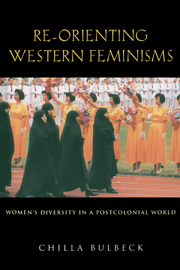Book contents
- Frontmatter
- Contents
- Acknowledgements
- Abbreviations
- Introduction
- 1 Fracturing Binarisms: First and Third Worlds
- 2 Individual versus Community
- 3 Mothers and Wives
- 4 Sexual Identities: Western Imperialism?
- 5 The International Traffic in Women
- Conclusion: Braiding at the Borderlands
- Endnotes
- Bibliography
- Index
1 - Fracturing Binarisms: First and Third Worlds
Published online by Cambridge University Press: 29 January 2010
- Frontmatter
- Contents
- Acknowledgements
- Abbreviations
- Introduction
- 1 Fracturing Binarisms: First and Third Worlds
- 2 Individual versus Community
- 3 Mothers and Wives
- 4 Sexual Identities: Western Imperialism?
- 5 The International Traffic in Women
- Conclusion: Braiding at the Borderlands
- Endnotes
- Bibliography
- Index
Summary
Not so very long ago, the Earth numbered two thousand million inhabitants: five hundred million men and one thousand five hundred million natives. The former had the Word; the others merely had the use of it.
–Sartre 1967:7This chapter begins the over-arching task of this book, to critically investigate the various oppositions by which white western women and ‘other’ women have been constructed. The first question we will ask is ‘Did exposure to western values, western economic and political forms improve the status of women in colonised societies?’ Generally the answer has been yes, that colonialism has brought ‘modernisation’ to the ‘backward’ others. Against this generally progressive tale, recent histories of colonisation, instead of claiming that missionary women ‘uplifted’ and improved the status of women in the colonies, offer ‘declension narratives’. They point to the power women often had in pre-capitalist societies. Whether against ‘ancient matriarchies’ or pre-colonial societies, the colonists sought to impose patriarchal structures and values on the colonised peoples.
The second question we will ask is what is the first and third world (and second, fourth and fifth worlds for that matter). Can we neatly classify all the countries of the world into these pigeonholes? If not, why do these terms continue to have salience? Given the western tendency to think in dualisms like third world and first world or backward and modern, the final section explores strategies for disrupting such black and white oppositions. Some writers have merely reversed the evaluative connotations of the former dualisms, so that west = bad and east = good.
- Type
- Chapter
- Information
- Re-orienting Western FeminismsWomen's Diversity in a Postcolonial World, pp. 18 - 56Publisher: Cambridge University PressPrint publication year: 1997



